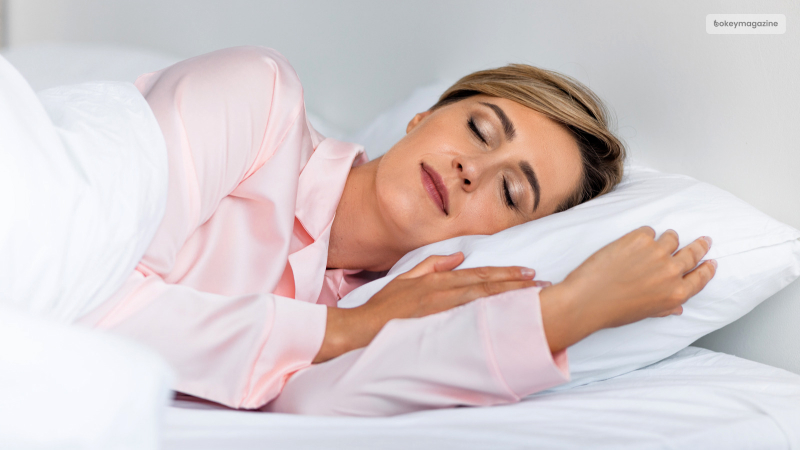
Is It Ok to Sleep with Makeup On?
The end of the day often ensures that you’ll be crashing into bed, ridding yourself of all the stress during the day. For most, removing makeup can’t be missed at night. So, what’s the deal if you accidentally sleep with makeup on?
Does it matter, or is it no big deal? We take you deeper into the after-effects of sleeping in makeup and why you should include makeup removal in your bedtime routine.
Why Removing Makeup Before Bed Is Important?
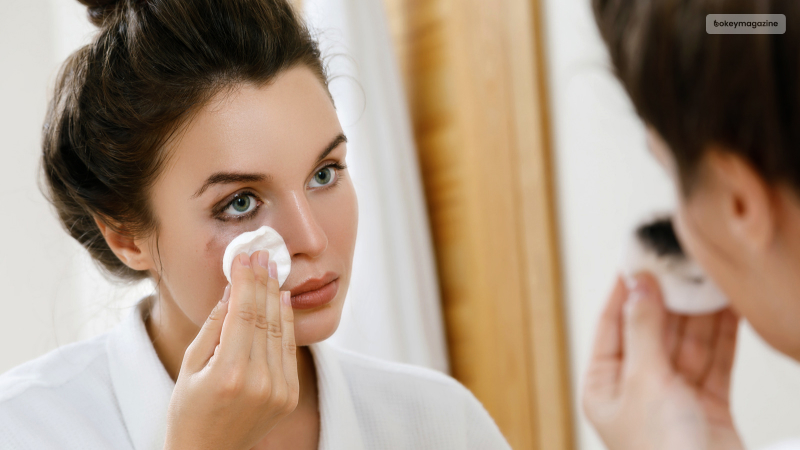
Most skincare professionals and dermatologists continually keep telling us that we have to clean our face before bed, and there’s an excellent reason for this. Removing makeup is not about removing mascara or lipstick; it’s breathing, regeneration, or skin repair overnight.
Throughout the day, your skin absorbs dirt from its surroundings and oils, pollution, etc. When you sleep with your makeup still in place, you seal these impurities on the skin, which will result in issues.
What’s Going on When You Sleep with Makeup On?
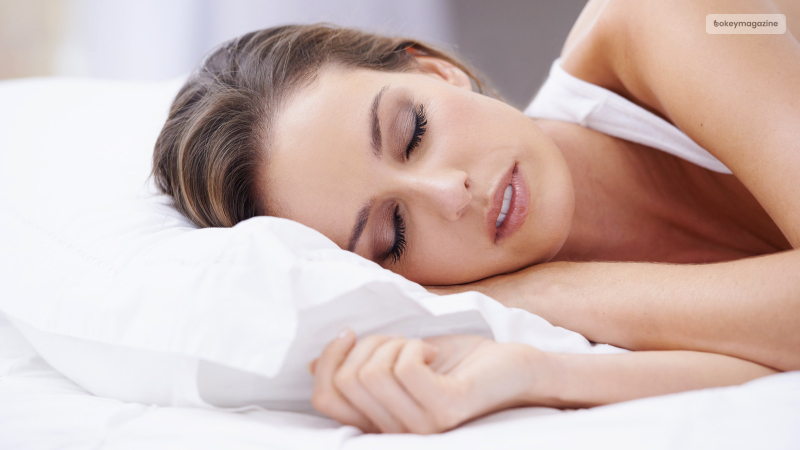
Here are some of the possible side effects of sleeping in makeup and why you shouldn’t sleep in it:
1. Clogged Pores and Breakouts
Clogged pores are one of the most direct side effects of sleeping in one’s makeup. Foundation, concealer, and powdery products sit in your pores all day. Overnight allows it to collect the bacteria and the oil, which blocks the pores. The implication is that your skin gets clogged, resulting in a breakout with acne, blackheads, and pimples.
Even for people who have never had a breakout, the side effects of sleeping in makeup comprise skin problems in the future. Makeup formulations might be heavy or labeled non-comedogenic, meaning they won’t clog pores.
However, such chemicals are still blended with your natural oil and sweat, which your skin produces while sleeping. This blend easily clogs pores, leading to inflammation and breakouts.
2. Premature Aging
Premature aging is not a term coined for everybody. However, the fact remains that not cleaning off makeup at night hastens the skin’s natural aging process.
Once you sleep in your makeup, it prevents the skin from performing most of its natural regeneration processes. The skin renews itself overnight, removing dead skin cells for cell turnover.
However, the makeup debris can hinder the process, causing you to amass dead skin cells on your skin that lead to dull, tired, and imbalanced skin.
Moreover, residue on the skin can cause oxidative stress. Exposure to pollutants, ultraviolet rays, and environmental toxins damages the collagen and elastin fibers in the skin, which are responsible for its young, firm texture.
Over time, the fibers start breaking and cause wrinkles, fine lines, and sagging of the skin. Going to bed with makeup on enhances the possibility of such effects that could make life fade early into the skin.
3. High Risk of Eye Infection
One more part where sleeping in makeup might cause major damage is the sensitive areas around your eyes.
When mascara, eyeliner, or eyeshadow stays overnight on your face, it might result in eye redness and subsequently cause possible infection. Makeup particles may easily find their way into the eye to cause irritation, redness, and even conjunctivitis, better known as pink eye.
This is bad news if you wear waterproof makeup; it is much trickier to remove generally and, if not thoroughly rinsed out, can quickly become a bacterial breeding ground.
If you let mascara stay on your lashes, they will weaken and dry, becoming brittle and a meal waiting for breakage. This is particularly challenging to those with problems from falling or hair loss already.
4. Dehydration and Dull Skin
Your makeup can absorb moisture off your skin or cause buildup and seal your skin’s natural hydration. Thus, sleeping in your makeup creates a barrier that stops your skin from getting what it needs – hydration, leading to dry, flaky, and dehydrated skin.
Eventually, your skin will become depressed due to moisture loss and look dull, dead, and harsh.
Makeup also creates a deposit of dirt and oil on the skin’s surface, disrupting its natural pH balance, causing irritation, redness, and sensitivity.
Another issue is that product buildup can cause occlusion of other beneficial skincare products, such as serums or moisturizers, which then cannot enter the skin to act as designed.
5. Skin Inflammation and Sensitivity
On top of that, for those who may be sensitive or who may sleep in their makeup, the inflammation of the skin can also increase.
Fragrances, dyes, and alcohol in makeup products can irritate your skin overnight, resulting in redness, puffiness, and feeling awful. Patients with rosacea, eczema, or acne-prone skin are especially prone to flare-ups if makeup is not removed properly at night.
Skin tissues are damaged over time, skin becomes thinner, and the efficacy of healing and repairing itself is reduced because of chronic skin inflammation, especially when makeup is left regularly.
Why Do People Sleep in Their Makeup?
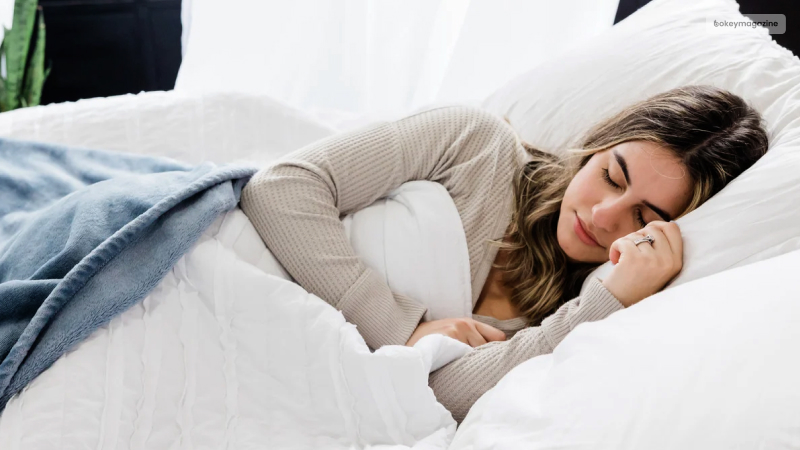
Why do people sleep in their makeup despite all the negative aspects associated with this habit? The main reasons for skipping makeup removal before bed are:
- Fatigue: Given a long day waiting ahead of someone, the prospect of devoting extra time to removing makeup may seem too cumbersome for one. Most people are too tired or rushed to take the proper skincare steps.
- Convenience: These are a few of the conveniences people use makeup wipes or a makeup remover that promises to make for easy removal. Most just don’t clean the skin well; they can leave behind considerable makeup and other impurities.
- Knowledge Imperative: No Harming Perception For many people, not immediately seeing breaks and irritation in their skin, especially with no breakout for some time when they sleep in makeup, will probably pop up in their minds. The painful effect that will surface over time could be premature aging and clogged pores.
- Habit: People might just get into the habit of not removing their makeup at night. In their thought, it does not harm. People even do not know how bad the repercussions can be because of this not-so-glamorous habit.
How Not to Sleep with Makeup On?
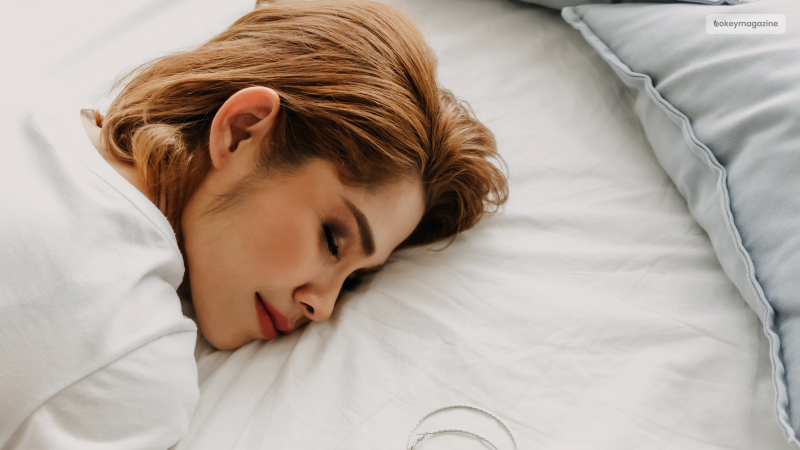
If you’re guilty of occasionally or habitually sleeping with makeup on, it’s time to rethink your nighttime skincare routine. Here are a few helpful tips to ensure your skin gets the care it needs every night:
1. Make Makeup Removal Part of Your Routine
Just like brushing your teeth every day, do remove makeup at night. Find time after work to clean your face and apply some moisturizer. Make this a no-brainer habit that you do, however tired you may feel.
2. Choose the right remover
Some cosmetics- waterproof mascara and long-lasting foundations spring to mind and are a bit more stubborn to remove. It is worth your while to learn the effective ones for the job.
Micellar water, cleansing balms, and oil-based makeup removers are better cleansers for breaking down makeup without irritating the skin. Makeup wipes are sometimes too abrasive and might leave a residue.
3. Double Cleanse
In case of long days or if there is heavy makeup, even double cleansing may be in the offing. You need to use an oil-based cleanser for makeup and sunscreen removal, followed by foaming or cream cleanser to remove impurities that remain post-oil-based cleansing. Hence, your skin has been fully cleansed.
4. Makeup-Free Days
While it is vital to remove makeup at night, allow your skin to breathe and revitalize by going without makeup sometimes. A makeup-free day will promote balancing oils and prevent pores from clogging up.
5. Use a Night Cream or Oil
Apply a moisturizing night cream or facial oil after washing off the dirt, dust, and other debris trapped in your pores. This will replenish moisture in your skin during sleep and rejuvenate and regenerate it.
A good night cream has hyaluronic acid, retinol, or peptides, which feed your skin for regeneration and hydration.
Wrapping Up!
It is unhealthy to sleep with makeup on. People think it won’t hurt to go to bed with their makeup still intact. But sleeping in makeup daily leads to clogged pores, breakouts, premature aging, and irritated skin.
During the night, your skin is regenerating and repairing itself; however, makeup on your face may interfere with how your skin works.
Just a little time after the day is over, wiping off that makeup before bed will place protective coverings. It reduces the chance of breakouts and irritation, and keeps your complexion fresh, clear, youthful, and healthy.
The next time you feel too tired to remove that makeup, remember that your skin will thank you in the long run. Make removing makeup a priority and see how your skin transforms.
You May Like To Read:



















Post Your Comment